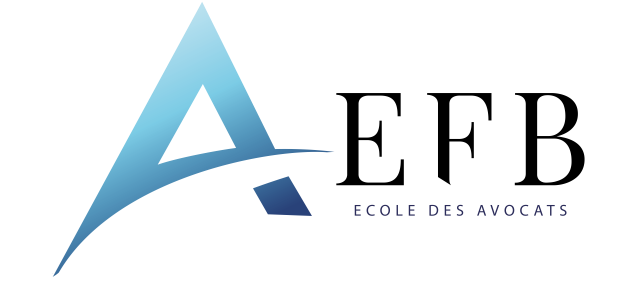About EFB
international
About EFB
Founded in 1981, the Paris Bar School is the most important of the eleven French law schools. It is responsible for initial and continuing education of almost half of the student lawyers and lawyers in France. For illustration, the 2023 class counts 1553 trainee lawyers.
The EFB is the law school of the nine bars within the jurisdiction of the Paris Court of Appeal. The president of the EFB is the chairman of the Paris Bar association. The director is appointed by the board of directors, currently Gilles Accomando.
How to become a lawyer in France ?
Most lawyers go to bar schools to be entitled to practise the legal profession.
In France, 11 schools implement a programme defined by the Conseil National des Barreaux.
To get into a law school, you need to :
Have a Master’s degree
Have passed a national entrance examination, which is organised by the faculty of law (Institut d’études judiciaires)
There are other access routes :
As a result of carrying out a professional activity covered by articles 97 and 98 of decree no. 91-1197 of 27 November 1991
For foreign lawyers who meet the conditions laid down in Articles 99 and 100 of Decree No. 91-1197 of 27 November 1991
Structure of the training
Once they have passed the university exam, trainee lawyers follow an 18-month training course organised by EFB.
Each year, EFB prepares the future lawyer for the realities and requirements of their future profession through three cycles of practical learning :
- six months’ training at the school, focusing on the fundamentals of the profession: ethics, practice management, procedures, advice, drafting deeds, etc.
- six months devoted to an individual personal project (PPI), a legal internship that can be carried out in a company, a court, an association, a public or international organisation, but also abroad, in a law firm, a company, a court. The trainee lawyers can as well complete an LLM, particularly in one of the partner.
- six months’ work experience in a law firm in France.
At the end of this course, student lawyers sit the bar admission exam, the Certificat d’aptitude à la profession d’avocat (CAPA), and, after passing this exam, can be sworn in ans register with a Bar Association.
The Training program
The general framework of the training program is defined by the Council National Bar (CNB). The EFB is constantly strengthening its educational offer in order to set up a training adapted to the expectations and the needs of the profession.Far from a theorical conception of law, the EFB offers a pragmatic and professional approach to the lawyer profession. Trainee lawyers are also trained in digital tools.
- Common Base : Litigation, ethics, alternative dispute resolution, public speaking
- Specialisation Path : courses chosen among more than 14 subjects (european and international law, real estate, M&A, criminal law, IP…) – 60 hours of classes- 3 practical workshops courses for each course
Continuing education allows lawyers to enrich or update their knowledge, develop their skills or acquire new ones. In France, since 2005, any lawyer registered with a Bar has been required to carry out continuous training of 20 hours per year or 40 hours over two consecutive years. In order to meet this obligation, the EFB, provides each year a program of nearly 330 training courses covering most of the specialties and areas related to their professional exercise.
All the speakers, legal professionals who are experts in their field, have educational expertise that guarantees the quality of training. At a time when digital is taking a very large place in our society, the teaching team is innovating and offering multimodal solutions both face-to-face and remote.
The international dimension of the lawyer profession has become essential and the EFB allows trainee lawyers to be able to seize professional opportunities on a European scale as well as to benefit from training that meets the needs of law firms in terms of international legal expertise.
Since 2012, more than 2,500 students have gone abroad for an internship or a study trip. The countries of the European Union are among the most popular destinations for students. To financially support these trips, the EFB allows its students to benefit from the Erasmus+ scholarship.
In order to offer to the most student lawyers the possibility of a course including European mobility, partnerships have been concluded with Bars Association. They offer students the opportunity of completing an internship in in a law firm while having access to courses given by training centres for lawyers.
The EFB’s international department also organises the international internship programme called Stage International aimed at young foreign lawyers wishing to discover the fundamentals of French law and to establish friendly and professional relations with their counterparts at the Paris Bar.
The school receives foreign delegations from all horizons and provides its pedagogical expertise to training Centres around the world.
In association with other European training Centres, EFB is coordinating LITEL (Lawyer’s initial training on european law), a project financed by the European Commission, in order to share good pedagogical practices and develop modules for student lawyers on the rule of law.

